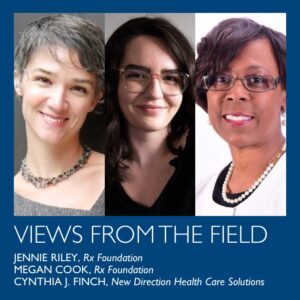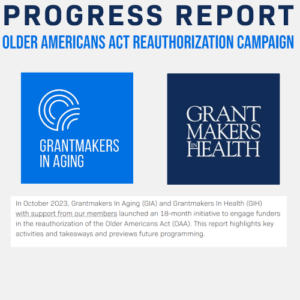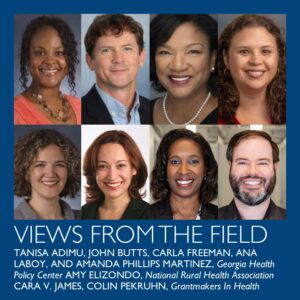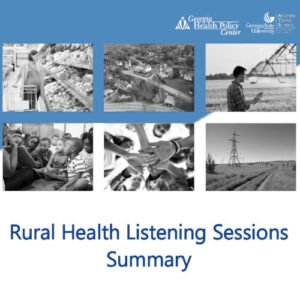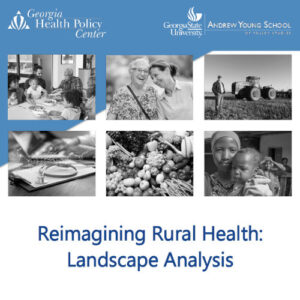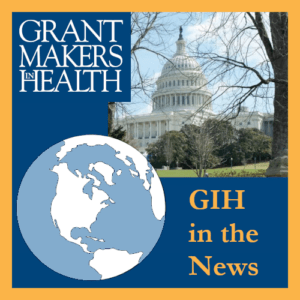GIH Advocacy for the Reauthorization of the Older Americans Act (OAA)
The OAA provides critical services that address the social drivers of health for older adults. Grantmakers In Health (GIH) and Grantmakers In Aging (GIA) are partnering to engage funders in advancing the reauthorization of this important piece of legislation.
Explore Population Health Topics
Latest Resources
Reimagining Rural Health and Well-being
To inform positive change, Grantmakers in Health (GIH) and the National Rural Health Association (NRHA) are partnering to reimagine a unified vision for health and well-being in rural America. The Georgia Health Policy Center (GHPC) was engaged to conduct a landscape analysis and facilitate listening sessions with rural health stakeholders at the local, state, and national levels.
GIH President and CEO Cara V. James Joined The Rural Impact Podcast for a Conversation about the Intersections of Policy and Philanthropy
On December 4, 2025, Cara V. James, President and CEO of Grantmakers In Health (GIH), was featured in an episode of The Rural Impact podcast. She joined Michelle Rathman, host of The Rural Impact and strategic communications advisor in health care policy, for a conversation on the intersections of policy and philanthropy, challenges with rural health funding, and more. “Policies that are impacting rural communities are…
Grantmakers In Health’s Partnership with Sustainable Agriculture and Food Systems Funders Highlighted in Inside Philanthropy Article
Due to cuts to the Supplemental Nutrition Assistance Program (SNAP) in H.R.1, along with the program’s suspension during the longest government shutdown in American history, Grantmakers in Health (GIH) is partnering with Sustainable Agriculture and Food Systems Funders (SAFSF) on a funder working group to coordinate philanthropy’s response. This partnership, along with SAFSF’s broader work, was highlighted in a November 13, 2025 Inside Philanthropy article. In the piece, Clare Fox, SAFSF’s…
Protecting Children’s Access to Health Care in Schools: The Impact of Medicaid Cuts on School Health Services
“Due to the remote area we serve, our students have little to no access to medical services otherthan those provided in schools.”—Superintendent from a rural school district in Michigan. Schools are essential places for children to access health services. An estimated 40 percent ofschool-aged children have at least one chronic health condition (National Survey of Children’sHealth, 2019). Among low-income children with special health careneeds, approximately 87percent do not receive necessary care, primarily due to financial costs and limited access (Childand Adolescent Health Measurement Initiative, 2022). Providing health care at school, where children spend most of their days, is crucial to addressing these concerns.
Kate B. Reynolds Charitable Trust: October 2025
Three new fact sheets inform funders about how recent federal budget cuts will impact health care access, food assistance, and the health of immigrant families. The fact sheets detail what is being cut, when the cuts will take effect, and what to do next.
Publications and Reports
Strengthening and Maintaining the Public Health Infrastructure
This Issue Focus article presents information on the issues facing the nation’s public health infrastructure and how health grantmakers help strengthen the system by partnering with federal, state, and local health departments, as well as with academic institutions and community groups that contribute to the public’s health.
Protecting Safe Havens for the Nation’s Children
In the U.S., children continue to suffer from violence in environments that should be safe havens for them: their schools and their homes. This Issue Focus presents philanthropic strategies for transforming homes and schools into safe environments where children can thrive and reach their full potential.
Terrorism and Meeting the Needs of the Nation’s Children
The events of 9/11 and the ongoing threat of terrorism have had a profound effect on all Americans. Moreover, the systems responsible for responding in the event of a terrorist act, such as health and public safety, are less prepared to address the needs of children than other populations. This Issue Focus looks at strategies funders can use to incorporate the needs of children into emergency preparedness planning by involving schools, hospital pediatric departments, and other youth-serving organizations.
Connect With Funder Peers on Population Health
Interested in exchanging strategies, information, and questions with your funder peers? Sign up for GIH E-Forums.





